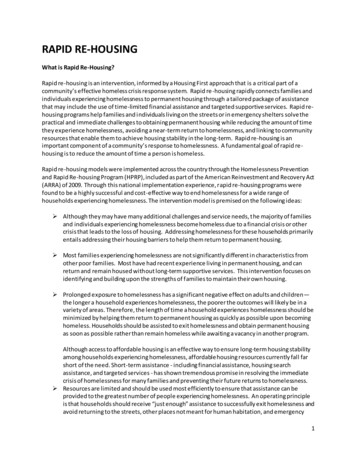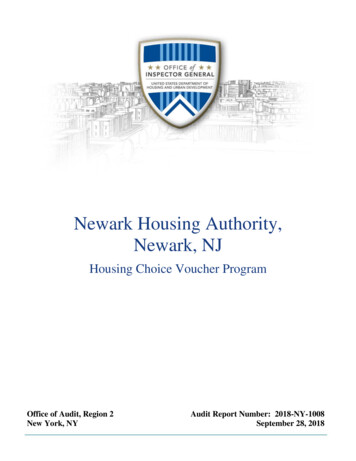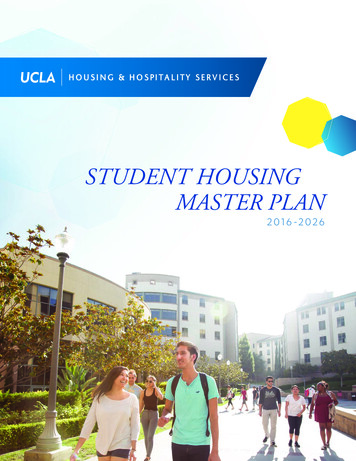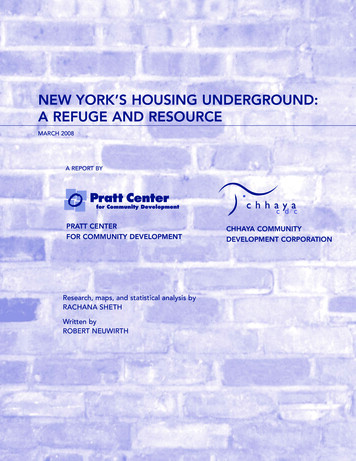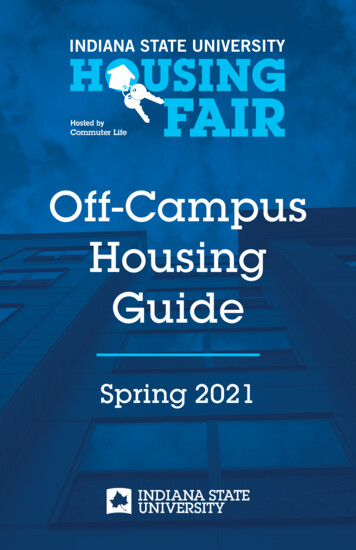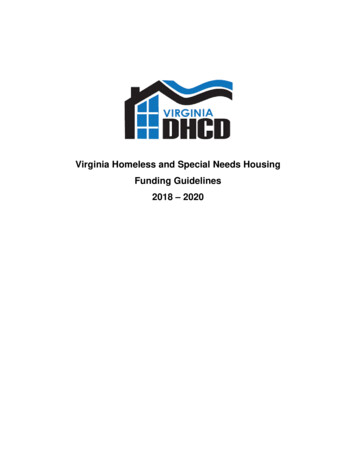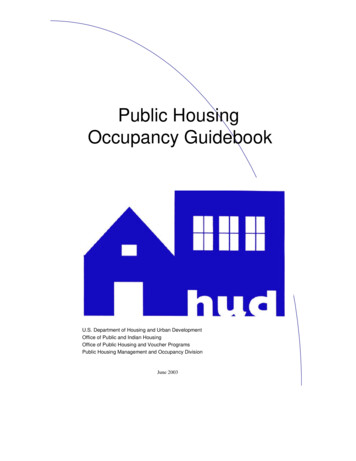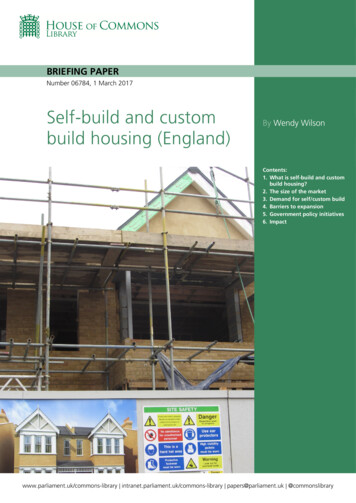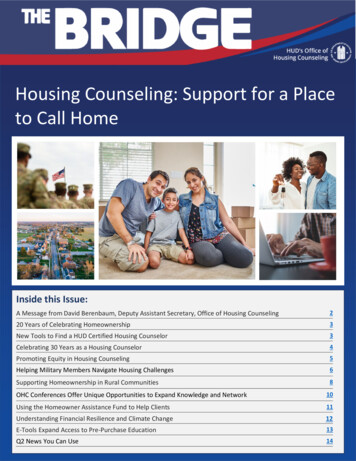
Transcription
Office of HousingOffice of Housing CounselinHousing Counseling: Support for a Placeto Call HomeInside this Issue:A Message from David Berenbaum, Deputy Assistant Secretary, Office of Housing Counseling220 Years of Celebrating Homeownership3New Tools to Find a HUD Certified Housing Counselor3Celebrating 30 Years as a Housing Counselor4Promoting Equity in Housing Counseling5Helping Military Members Navigate Housing Challenges6Supporting Homeownership in Rural Communities8OHC Conferences Offer Unique Opportunities to Expand Knowledge and Network10Using the Homeowner Assistance Fund to Help Clients11Understanding Financial Resilience and Climate Change12E-Tools Expand Access to Pre-Purchase Education13Q2 News You Can Use14
PAGE 2The Bridge Volume 10, Issue 2A Message from David Berenbaum, Deputy AssistantSecretary, Office of Housing CounselingJune is National Homeownership Month, a time to share our stories, celebrateour impact, and create opportunities for the next generation of homeowners.Over the past year you have made a difference in the lives of over one millionconsumers. But it's not just the sheer number of people we have helped that'simportant. It is equally critical that we continue to showcase our collective resultsand the power of housing counseling in helping the nation address the greathousing challenges before us.This issue of The Bridge spotlights initiatives and housing counseling professionalsthat are making a difference to promote homeownership and healthy, sustainablecommunities. Our network of HUD certified professional housing counselorsserves as one of our nation’s greatest opportunities to address the racial equitygap in homeownership.Counselors are also on the front lines educating consumers about down-payment assistance and innovative mortgageprograms to overcome the affordability and housing supply challenges that have priced out many low- and moderateincome first-time homebuyers and left those seeking affordable rental housing with few options to live incommunities close to work or in neighborhoods of opportunity.HUD funding supports the entire range of counseling and training necessary to ensure people make informed,responsible choices that work for their families— whether it's buying or renting a home, improving financial literacy,protecting families' rights against discrimination, aging in place, or preventing foreclosure, eviction or homelessness.You know the impact of our collective work and understand that housing counseling works.In the coming months, we will be launching new outreach programs to educate consumers to the availability of HUDapproved counseling services so that our program is no longer a “best-kept secret.” We look forward to working withyou on this important campaign and to launching new pre- and post-purchase counseling programs that expand yourcapacity to provide culturally sensitive and linguistically appropriate counseling.Whether you’re a housing counselor, a HUD-approved housing counseling agency or a participating state housingfinance agency, or a member of the Office of Housing Counseling’s community, thank you for your partnership withus and for the critical services you are providing to the nation’s individuals, families, and communities this month andthroughout the year.Sincerely,David
PAGE 3The Bridge Volume 10, Issue 220 Years of Celebrating HomeownershipJune marks the 20th anniversary of National HomeownershipMonth (NHM), which is traditionally proclaimed by PresidentialProclamation in late May or early June. During the month ofJune, the Office of Housing Counseling commemorates NHMand reinforces its commitment to homeownership as anessential way for individuals and families to build wealth.During this month, HUD furthers its commitment by working toremove barriers to homeownership and addressing the criticalhousing supply shortage and affordability challenges ournation faces. HUD is also reinforcing its support for potentialhomeowners by increasing accessible, affordable, andequitable homeownership opportunities through partnershipswith its various stakeholders across the industry. And housingcounselors are vital to these efforts.This year, HUD is planning many events forNHM, so check out the Housing CounselingTraining Digest for more details.New Tools to Find a HUD Certified Housing CounselorHUD recently launched the new Housing Counselor Agency(HCA) Locator Tool. The new resource offers improvednavigation by zip code, state, and service type to make findingand engaging with HUD-participating HCAs easier forconsumers, federal partners, and other stakeholders.If you prefer to speak to a Federal Housing Administrationcustomer service representative, please dial 800-569-4287 or202-708-1455 (TTY) during 8:00 AM – 8:00 PM EST. Therepresentative can help direct you to a variety of availableservice types by zip code or state.The HCA Locator Tool and calling services are available in English and Spanish. Further, customer servicerepresentatives can connect callers to the newly enhanced professional language line that enables them to engagewith interpreters who can speak 240 languages.Visit the HUD Exchange Find a Housing Counselor page for additional resources.
PAGE 4The Bridge Volume 10, Issue 2Celebrating 30 Years as a Housing CounselorThe Office of Housing Counseling (OHC) continues to applaud HUDcertified professional housing counselors and their daily impact.Sheri Williams is a dedicated housing counselor who recentlycelebrated 30 years at Money Management International (MMI).During her lengthy tenure, she has assisted thousands of individualsand families in becoming financially stable and achieving their housinggoals. In this candid interview, Sheri responds to questions about herthree decades of experience and shares her thoughts on housingcounseling; past, present, and future.What led to your working for a non-profit and becoming a housingcounselor?“MMI was called Consumer Credit Counseling Services (CCCS) when Istarted with the organization. I saw an advertisement in thenewspaper for a credit counselor, so I applied and got the job,” saidSheri. At that time, CCCS was only offering credit counseling. MMIbecame a HUD-approved housing counseling intermediary in 2004, but it wasn’t until the housing crisis of 2008 thatSheri became a housing counselor. Sheri continued, “I didn’t know anything about housing when the foreclosurecrisis hit, only credit and budgeting, so I had to learn by taking classes and participating in seminars.”How do you think housing counseling and the role of housing counselors have changed over the past 30 years?“The housing counselor’s role is still the same, to make clients aware of their options, regardless of whether it’srelated to pre-purchase or foreclosure counseling. What has changed is there are so many more options available.Counselors are required to know more, and changes in the industry are always happening,” Sheri said.What do you think will be different about housing counseling in the future?“I think technology like apps and other tech will be more common and get incorporated even more into the work ofhousing counselors. Some counseling sessions can last almost two hours because there are a lot of details that needto be covered. Technology is needed to make counselors more efficient and reduce the time currently needed withclients.”What impact did the requirement that housing counselors be certified have on you?“I think all counselors should be HUD certified. Certification indicates you’ve been educated. But it felt like I wastrying to pass the bar exam or get a real estate license because there was so much to remember,” Sheri said, smiling.Has there been a case with a client you worked with that you found particularly compelling?“A single mother with three kids lost her job during the pandemic because she had to stay home with them. She fellthree months behind on her rent. A neighbor referred her to MMI where she met with me. I told her about theeviction moratorium.” Sheri said she also gave her information on programs offering rental relief. The mom later told
PAGE 5The Bridge Volume 10, Issue 2Sheri she saved her from life on the street with her three kids.“Lots of people are one paycheck away from being on the street. I’ve also had hard times in my life and know whatthat’s like. I put myself in the position of the client because it could be me in the same situation,” said Sheri.What would you tell someone who might be interested in a career as a housing counselor?“It’s a rewarding job and at times, can be very humbling. You have the ability to impact the lives of everyone you talkto. They call you for help and hope. There is a lot you need to know, and you have to be a people person. I think weare put on this earth to help each other and being a housing counselor is one way to do that. It gives people hope fortomorrow.”Housing counselors like Sheri make asignificant impact every day, and OHCwants to recognize them. If you knowa HUD certified housing counselorthat should be celebrated, post onsocial media using#HUDCertifiedProud or email:thebridge@hud.gov.Promoting Equity in Housing CounselingThe Office of Housing Counseling (OHC) continues to embedequity in conversations and deliverables focused on training,outreach, and program design. To that end, on March 16,2022, OHC administered a survey to 1,219 housing counselingagencies (HCAs) to learn more about the type of supportagencies need to achieve equity in their work. The surveyasked HCAs to share their perspectives on (a) how well theysupport diverse populations (b) utilize available resources toassess their current standards and capacity and (c) identifytheir future needs.In April 2022, after analyzing the data from the survey, OHC invited 14 HCAs to join an Equity in Housing CounselingInformation Exchange to review survey data and hear from HCAs about best practices. Breakout and plenary sessionsfocused on key aspects of serving clients with diverse cultural, language and racial backgrounds. Discussion topicsincluded the importance of “trusted messengers” and community connections, the unique needs of refugee groups,best practices in language access, and cultural considerations related to transportation, gender and finances. Theoffice selected participants based on their survey responses to geography, agency size, number of clients served, andexpression of interest to learn more. At a later date, OHC will release high-level outcomes and takeaways developedby the participating agencies to all HCAs.
The Bridge Volume 10, Issue 2PAGE 6HUD recently published its Equity Action Plan to respond to the Biden Administration’s Executive Order onAdvancing Racial Equity and Support for Underserved Communities Through the Federal Government.The 17-page plan outlines the actionable next steps HUD will take to build equitable communities throughprocurement, resources for fair housing, and activities to eliminate the racial homeownership gap. HUD’sFY2022–2026 Strategic Plan explicitly outlines ways to implement these changes as an organization.Helping Military Members Navigate Housing ChallengesMembers of the military community have unique financial andhousing needs. Housing counselors can play an essential role inhelping military members and their families navigate challengesassociated with these needs and avoid scams and other predatorypractices.Because many military members move frequently, they arevulnerable to housing scams promising discounts and specialamenities. Such schemes have the potential to lower credit scoresand even result in a stolen identity. The negative impact of thesescams can last for years.
PAGE 7The Bridge Volume 10, Issue 2Navicore Solutions in Freehold, New Jersey, works with military members regularly. The agency’s HUD certifiedhousing counselors follow the process illustrated below to ensure that military members have the information toreach their housing goals and stay protected.Housing Counseling Process for Military Members1 Provide resources specific tomilitary members.Protections for Service MembersMilitary OneSourceMilitary Consumer ProtectionMilitary Family Support3 Assist with special budgetassessments involving:Military payPre-deployment pay52 4 Encourage participation in self-studypersonal finance programs.National Foundation for Credit CounselingSharpen Your Financial Focus ProgramIf conducting estate planning, connect themwith resources to assist in the following:Establishing a Power of AttorneyCreating a willEnsure positive outcomes by providing continued support.New HUD Exchange ResourceA newly launched page on the HUD Exchange provides resources for HUD certified housing counselorsserving the military community.The page has resources on the different types of housing options, rights, and protections for the militarycommunity.
PAGE 8The Bridge Volume 10, Issue 2Supporting Homeownership in Rural CommunitiesThe Office of Housing Counseling (OHC) is committed toensuring that people have access to housing counseling andits benefits regardless of where they live.Western Arizona Council of Governments (WACOG) in Yuma,Arizona, and Brick Capital Community DevelopmentCorporation in Sanford, North Carolina, share best practiceson how to help people realize the dream of homeownershipin rural communities.Homes built by Brick Capital Community Development CorporationWACOG offers housing counseling to rural counties across western Arizona as part of its holistic approach to endingpoverty. The agency also provides early childhood programs and senior services and aims to remove obstacles thatblock the achievement of self-sufficiency.Mia Armenta, Senior Program Manager for Community Economic Development, says 75% of the clients WACOGserves live in distant and rural areas, which creates one of its biggest challenges. As a result, the agency relies heavilyon community partners to help make people aware of its services. “These partnerships are essential,” Armenta says.“We have community organizations across each county who have information about the services we offer and arewilling to help us get the word out. We’ve met with them; we’ve trained them, and they know how to best representus.”In addition to developing partnerships, Armenta says the agency has expanded the way it offers housing counselingto include virtual sessions and telephone meetings. They are even considering creating a mobile housing counselingunit to be more accessible. Their goal is to make housing counseling available to everyone. “It’s important for us toreach people where they are,” Armenta says. “Make your services as accessible as possible. That would be my adviceto any agency serving rural communities.”Armenta further recommends agencies consider the following when offering remote services: Access to technology: Some clients will have access to the technology for a virtual session; others willnot. Offer multiple ways to meet with people.Provide training on how to use the technology: Clients may need guidance on how to use the platformsused for virtual housing counseling sessions.Offer materials on different platforms: Make hard copies available even if they are available online.
The Bridge Volume 10, Issue 2PAGE 9In rural North Carolina, Brick Capital Community Development Corporation combines housing counseling withaffordable housing access to help people find a place to call home. Kerry Bashaw, Executive Director, says one of theagency's biggest challenges is affordable housing inventory. To meet that need, the agency plays multiple roles. Theyprovide housing counseling, manage affordable rental units, and build affordable single-family homes. They alsoleverage HUD Community Development Block Grant (CDBG) funding and money from private philanthropic investors,creating a financial pipeline to homeownership.“We’ve become a one stop shop for our clients,” Bashaw explains. “When someone comes to us for housingcounseling, we meet and together decide what homeownership looks like for them. We either help identify and takethe steps to get into an existing home in the market or we can build an affordable home.”To date, Brick Capital CommunityDevelopment Corporation has built over 60homes and is hoping to ramp up affordablehousing development as the need continuesto grow. “It’s important to us that as manyfamilies as possible get the opportunity tobecome homeowners and build wealth forthemselves,” Bashaw said. “Homeownershipis more than just having a roof over yourhead. It’s a way to build wealth that can bepassed on through the family.”
The Bridge Volume 10, Issue 2P A G E 10OHC Conferences Offer Unique Opportunities to ExpandKnowledge and NetworkThe Office of Housing Counseling (OHC) works diligently to ensure HUD-certified housing counselors have theopportunity to expand their industry knowledge. Housing counselors can attend multiple events throughout the yearto gain valuable insights and learn about new tools and resources that can enhance their ability to serve theircommunities.Serving Communities Through Housing Counseling ConferenceIn May 2022, OHC, in partnership with HUD’s Offices of Community Planningand Development (CPD) and Field Policy and Management (FPM), sponsoredthe Serving Communities Through Housing Counseling virtual conference toexplore the opportunities for past and future collaborations between housingcounseling agencies (HCAs) and CPD grantees. Throughout the conference,leaders and experts in the industry identified the qualities of successfulpartnerships between CPD programs and housing counseling programs andhow collaboration can best serve clients.View conferencematerials andrecorded sessionsThe conference featured six sessions on topics such as the role of HCAs in supporting homeless, rental, andhomebuyer programs, and how to build relationships among these programs on local and state levels. In addition, byreviewing various HUD programs, such as the Community Development Block Grant (CDBG) program, the HOMEInvestment Partnerships Act (HOME) program, the Continuum of Care (CoC) program, and the Emergency SolutionsGrants (ESG) program, speakers outlined eligible housing counseling activities and how HCAs can partner with CPDgrantees to support the efforts of these programs.
P A G E 11The Bridge Volume 10, Issue 2Using the Homeowner Assistance Fund to Help ClientsState housing finance agencies (SHFA), District of Columbia (D.C.),Puerto Rico, Tribes and Tribally Designated Housing Entities (TDHEs),and other administering entities (i.e., “eligible entities”) across thecountry administer the Homeowner Assistance Fund (HAF) for theirareas. The HAF is a critical resource for housing counseling clients inhelping address a range of homeownership-related expenses causedby the COVID-19 pandemic. For additional information and resources,view the HUD Exchange COVID-19 Response and Relief Funding Chartfor Housing Counselors.What is the HAF?Housing Counseling WebinarThe HAF is a U.S. Department of Treasury program funded bythe American Rescue Plan Act of 2021 (ARP). It is designed toprevent mortgage delinquencies, foreclosures, loss of utilities orhome energy services, and displacement of homeownersexperiencing financial hardship.How the HomeownerAssistance Fund Can ServeYour ClientsWho is Eligible for HAF? What are They Eligible to Receive?To be eligible, homeowners must have experienced a COVID-19-related financial hardship on or after January 21,2020 (includes hardships occurring before January 21, 2020, but continuing after that date). They must also have anincome equal to or less than 150% of the area median income or 100% of the median income for the United States,whichever is greater. Further targeting is required for the eligible entity to serve at least 60% of the HAF funding toserve those at or below 100% of median income. In general, funds from the HAF may be used for qualified expensesrelated to mortgages and housing, including assistance with mortgage payments or other payments to facilitatemortgage reinstatement, property taxes, homeowner’s insurance, utility payments, manufactured home lot rent, andother specified purposes. Homeowners and counselors should consult their jurisdiction’s HAF rules to understandwhich expenses are eligible in their area.How is Housing Counseling Being Delivered Under HAF?Housing counseling agencies (HCAs) play a key role in HAF across the country as they assist homeowners facingforeclosure or displacement. Under HAF, as provided by Treasury guidance on February 24, 2022, HCAs are eligibleentities along with Tribal governments. However, each HAF participating entity will determine whether and how tofund housing counseling related to the program. However, in many cases, housing counselors will play a key role inhelping homeowners access HAF and understand how the funding may help them reach their housing goals.How Do I Find Out if HAF has Launched in myState/Area?The National Council of State Housing Agencies (NCSHA) HAF Map Tool has adetailed list of eligible entities, the status of taking applications, links to find outmore about the programs, and what types of assistance are eligible under theHAF program. The tool is also available in Spanish. NCSHA also provides thishelpful linkage to HAF Programs Administered by Tribal Governments.
The Bridge Volume 10, Issue 2P A G E 12Understanding Financial Resilience and Climate ChangeAs climate change continues to impact the lives of everyAmerican, the federal government’s response to climatechange has changed as well.The Biden Administration has made climate change ahigh priority and has established a target of at least a50% reduction in greenhouse gas emissions by 2030 andnet-zero emissions by 2050. At the same time, theadministration has emphasized addressing climatechange and making the United States climate resilient,which is closely tied to improved economic and financialgrowth.The Financial Literacy and Education Commission’s (FLEC) work is an example. FLEC’s mission is described assustained financial well-being for all individuals and families in the United States. To further that vision, thecommission sets the strategic direction for policy, education, practice, research, and coordination, so that allAmericans make informed financial decisions. FLEC is comprised of more than 20 federal agencies that administerfinancial literacy programs or initiatives.HUD’s Office of Housing Counseling (OHC) is leading the interagency effort to develop the housing portion of thisanalysis. There are more than 18 subject matter experts from seven different agencies, including the Federal HousingFinance Agency (FHFA), the Consumer Financial Protection Bureau (CFPB), the Office of the Comptroller of theCurrency (OCC) Treasury, and the Federal Emergency Management Agency (FEMA) working together to identify themost important climate-related issues that affect households. With the assistance of other federal agencies, HUD willbe writing a complete and comprehensive report that examines where climate change will occur, its potentialimpacts on individual households, and which specific populations are at greater risk of climate change negativelyimpacting their finances.In addition to reviewing these areas, the report will define what it means to be financially resilient in the face ofclimate change. Additionally, it will provide spatial analysis that looks at a cross-section of climate change data andfactors such as housing prices, homeownership rates, and vulnerable populations with the goal of making policyrecommendations. Overall, the report is intended to be a tool that policymakers can use to anticipate where stepsneed to be taken to help mitigate the effects of climate change on families and communities.
P A G E 13The Bridge Volume 10, Issue 2E-Tools Expand Access to Pre-Purchase EducationQuality homebuyer education and pre-purchase educationensure that buyers receive unbiased information to makeinformed decisions about whether, how, and where to buy ahome. In addition, it helps buyers meet the pre-purchaseeducation requirements of many mortgage products andassistance programs. However, it is not always easy forprospective buyers to access traditional in-person educationsessions or virtual sessions held on pre-scheduled days andtimes. Care-giving responsibilities, inflexible work schedules,mobility challenges, or other disabilities have prompted thehousing counseling industry to develop alternative ways forclients to access these important services.With a growing number of online homebuyer education courses, there are more ways than ever for prospectivehomebuyers to access pre-purchase education.The benefits of online homebuyer education include: Self-paced content is accessible at a time convenient to the homebuyer and at any location they choose.Content is the same as homebuyer education provided in person and is designed to meet HUD guidelines forpre-purchase education and the National Industry Standards for Homeownership Education and Counseling.Homebuyers are better prepared should they also need or require one-on-one counseling.Housing counseling agencies (HCAs) across the country are expanding into online education, whether throughagency-designed virtual sessions or in partnership with national e-providers.Agencies receiving HUD Housing Counseling Grants may be reimbursed for initial set-up fees involved in contractingwith third-party housing education providers.
P A G E 14The Bridge Volume 10, Issue 2HUD Approved Agencies offering online education must also offer the option of one-on-one counseling on the sametopics, but online education can be a great supplement to one-on-one housing counseling. By first helping the clientbetter understand the home buying process, they are more prepared to focus on the implications for theircircumstance. The result is online homebuyer education and one-on-one counseling can be both complementary andmutually supportive. A list of national online education platforms and other technological tools is located on the HUDExchange.Q2 News You Can Use9902 data provided by housingcounseling agencies (HCAs) fromQ4 Fiscal Year (FY) 2020–Q4Fiscal Year (FY) 2021.EDITORIAL BOARDEditor in ChiefSuzanne IsaacsAssistant EditorJulie RiceFor additional information about an article, or to submit features of interest, general information, testimonials, orannouncements, contact thebridge@hud.gov.
and the power of housing counseling in helping the nation address the great housing challenges before us. This issue of The Bridge spotlights initiatives and housing counseling professionals that are making a difference to promote homeownership and healthy, sustainable communities. Our network of HUD certified professional housing counselors


